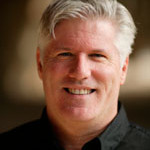At the Nieman Conference, everyone talks about “storytelling.” It’s what most writers here aspire to, rather than everyday news journalism. So when I walked into the main hall for the Connie Schultz keynote address, the story of the state of the journalism industry was told in the size of the room itself. The welcome and keynote was in the same hall as last year, but a room divider had been added. There were still hundreds of people, but by the looks of it, about half as many as in 2008. Schultz’s speech was great, but the welcome session felt, at times, like a funeral.
But it wasn’t all doom and gloom. Schultz shared some inspirational stories and encouragement for writers. “Being scared,” she said, “sometimes is a really good thing.” I wasn’t familiar with Schultz, a Pulitzer -Prize-winning columnist for the Cleveland Plain Dealer, but I’m a fan now. She blended personal stories with professional insights and humor. She talked about her father, a working-class man who hated his job and once said to her “you could teach a monkey to do what I do,” and how he dreamed of giving his daughters the life he didn’t have. I almost teared up. (Being a new father tends to make me a sucker for fatherhood stories). She closed with a word of encouragement to the audience, some of whom lost their jobs in the past year: “Every narrative has a beginning, middle, and an end… including yours.”
The fact that I’m here, at this conference, trying to reinvent myself as the writer I always should have been, is a testament to that idea.

Tom French
The first session I attended was “Narrative Archaeology” with Tom French. As I expected, having seen French last year, it was a great session, filled with practical tips and techniques for doing narrative journalism. French, another Pulitzer Prize winner, recently left the St. Petersburg Times to take a job teaching journalism at Indiana University. His departure from daily journalism is sad, but also makes sense: He’s a natural teacher, with a tremendous conversational style and a wealth of experience as a feature writer and editor.
His handout, “Hunting and Gathering” (PDF) covers some key ideas about the how to report for good featuring writing. Here are a few of the best gems from his presentation that didn’t make the handout:
- When trying to do narrative on deadline, “choose a scene and zoom in tight
- When in doubt, under-explain” (let your readers put the piece together; they’re usually smarter than we expect)
- French says that after reporting for a story, he typically has ten times as much content as he can use. How to select what makes the cut? Make a “greatest hits” list: quotes, scenes, details that you would “die” if they didn’t make the story, and start from there. Most likely, he notes, even all of those won’t make it.
Next, I attended Walt Harrington’s session on “Intimate Journalism: How to go from “sources in a story” to characters who reveal the human condition.” While I have tremendous respect for Harrington as a writer, this session was disappointing. Harrington was the opposite of French: formal, scripted, and, it seemed to me, somewhat aloof. For the first half of it, Harrington basically read from a prepared speech on the merits of deep, sophisticated narrative journalism and how hard it is. It was an interesting piece that I’d like to read, but I’d rather he had talked more informally about his process and how he learned to do his work. The Q&A that followed his speech was a little more interesting.
Harrington is skeptical that anyone can become a good narrative journalist by taking workshops and reading about techniques. Instead, he argues, you have to “learn to do it only by doing it.” His other simple suggestion, other than years of experience and hard work, is that if you want to be a good nonfiction writer, you need to read a lot of good nonfiction. I think he’s right on all of this, of course, but it still would have been helpful to hear more stories and examples of the lessons he learned along the way of becoming a great writer himself.
After that, I roamed around the reception for a bit (I’m terrible at these things), ate crackers, and met Modou Nyang, who came all the way from Gambia to attend the conference. Very nice guy. Made the trip from D.C. seem like a short walk…
![Reblog this post [with Zemanta]](https://i0.wp.com/img.zemanta.com/reblog_e.png)